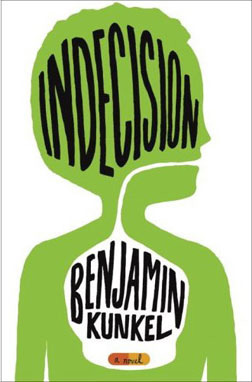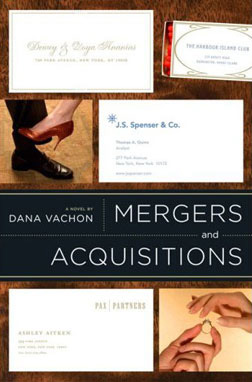IMPRINTS 4: Dana Vachon, Doug Stumpf and Jim Cramer
29.09.07
 In Benjamin Kunkel’s ’05 debut Indecision, his main character, Dwight Wilmerding, begins stuck in the titular state and, via an experimental pharmaceutical, a trip to Ecuador, a life-shaking brush with a hallucinogenic known as the San Pedro cactus, and finally an affair with a Belgian radical named Brigid, comes to discover social responsibility. So excited is Dwight, towards the end of Kunkel’s novel, about what he calls democratic socialism that he blurts out his newfound purpose in the midst of a ten-year high school reunion speech, back on American soil:
In Benjamin Kunkel’s ’05 debut Indecision, his main character, Dwight Wilmerding, begins stuck in the titular state and, via an experimental pharmaceutical, a trip to Ecuador, a life-shaking brush with a hallucinogenic known as the San Pedro cactus, and finally an affair with a Belgian radical named Brigid, comes to discover social responsibility. So excited is Dwight, towards the end of Kunkel’s novel, about what he calls democratic socialism that he blurts out his newfound purpose in the midst of a ten-year high school reunion speech, back on American soil:
On behalf of which ideology I mean to say that only when other people have the same freedom which we have devoted ourselves to squandering—only then will we really know what we should have done with ours in the first place. So let us remain faithful to those privileged kids we were by seeking to honor and cancel our condition by making it general throughout the world.
Tommy Quinn, the indecisive protagonist of Dana Vachon’s debut Mergers & Acquisitions, is also the beneficiary of an upper-middle class background and top-shelf schooling, and like Dwight, starts out with no idea at all what to do with what he’s been given. “All around me people spoke of bonuses and booze and drugs and sex and cheating and having,” Quinn records, and we are to find out, before the book is over, how thoroughly Quinn will or won’t squander the freedom those things ostensibly represent.
To wit: Quinn, whose way of mourning his older brother’s premature death and his father’s failed but stratospheric ambition is to attempt to make the money they would’ve wanted to make themselves, dodges inertia by signing up at an investment bank. For extra motivation Quinn has a girlfriend, Francis Sloan, whose wealthy background theoretically needs to be satisfied with more of the same. Francis is also in the midst of a nervous breakdown, setting up Quinn for a choice he can’t make and Vachon with a conflict with which to drive his plot.
 What plot there is, anyway—mostly, Vachon takes Mergers & Acquisitions as an opportunity to string together different set pieces sending up the rich. These include Quinn’s M&A training program (“two weeks of ululating static, thickly accented English phrases, and lots of equations” at the hands of a 20K/week Japanese foreign-currency expert), the multiple deaths of overfed superiors, a quail shoot, and a performance art premiere at the MoMA, featuring a perpetual motion machine called “La Machine Etonnante,” by the artist Yves Grandchatte.
What plot there is, anyway—mostly, Vachon takes Mergers & Acquisitions as an opportunity to string together different set pieces sending up the rich. These include Quinn’s M&A training program (“two weeks of ululating static, thickly accented English phrases, and lots of equations” at the hands of a 20K/week Japanese foreign-currency expert), the multiple deaths of overfed superiors, a quail shoot, and a performance art premiere at the MoMA, featuring a perpetual motion machine called “La Machine Etonnante,” by the artist Yves Grandchatte.
Quinn’s best friend, Roger Thorne, makes an appearance in “Etonnate”’s pornographic finale, having been previously filmed running around on his fiancé with Granchatte’s handler, a flexible Hollywood heiress by the name of Sophie Dvornik. “The truth is that Roger Thorne, the M&A banker might have gotten off the hook” in full sight of the assembled crowds and his fiancé, Quinn notes, “had Roger Thorne the S&M enthusiast not decided to throw his trademark 1980s heavy-metal hand signs to the cameras in Sophie Dvornik’s bedroom.”
In this way, Vachon dodges the quandary (both his and Quinn’s, in fact) of locating a definite moral position in regards to the excesses of his characters by being funny. Yet eventually the weight settles, and just as Kunkle did in Indecision, Vachon sends Quinn to Latin America to save himself or die trying. This high-minded struggle slips beyond metaphor when the luxury yacht Quinn is aboard, along with Thorne and a light-footed banker named Manuel Oliveira Rodrigo Orjuela de Navarro (note the monogram) is boarded by Zapatistas near Cabo San Lucas. Self-discovery ensues.
And yet mild plot arc aside, Mergers & Acquisitions is unabashed in being about money, and people who have money—“about” in its most neutral sense, since to believe that Vachon’s detailed accounting of the very rich is satire is to believe that he disapproves. This seems unlikely. As Quinn recounts his months after graduating college, he recalls his obligatory trip to visit friends in Europe, writing: “In London I stayed with the son of a Moroccan arms dealer and tried cocaine for the first time. In Paris I stayed with a descendent of Madame de Stael and slept with a girl named Alexandrine. I thought it strange that with fifteen thousand dollars you could do all these things, and that without it, you could not.” That is: the rich may be reprehensible, but they’re still the only game in town.
 Wealth rubs people in different ways, but if you’re Doug Stumpf, author of Confessions of a Wall Street Shoeshine Boy, it just rubs you raw. Confessions, which rolls money-porn, wish fulfillment, and a cynical grab at the film-rights zeitgeist into one jive-talking package, depicts the relationship between a 22-year-old Brazilian shoeshine wizard named Gil, and a somewhat desperate, older journalist, Greg Waggoner, who works at the innovatively-named magazine Glossy. Gil, for his part, has yet to master English, and Stumpf, for his, has yet to master plausible dialog in any language. Here’s Gil, talking about plying his trade:
Wealth rubs people in different ways, but if you’re Doug Stumpf, author of Confessions of a Wall Street Shoeshine Boy, it just rubs you raw. Confessions, which rolls money-porn, wish fulfillment, and a cynical grab at the film-rights zeitgeist into one jive-talking package, depicts the relationship between a 22-year-old Brazilian shoeshine wizard named Gil, and a somewhat desperate, older journalist, Greg Waggoner, who works at the innovatively-named magazine Glossy. Gil, for his part, has yet to master English, and Stumpf, for his, has yet to master plausible dialog in any language. Here’s Gil, talking about plying his trade:
“To buff them off the feets you got to put the heel between your legs, a little bit up from your knees, and hold with your legs, with the point a little bit out, so you got space to buff them up. You put a towel to cover up your whole pants, so you don’t dirt it.”
Greg is desperate for a story; Gil, angry about the firing of one of his buddies from the Wall Street firm at which he works, becomes Greg’s source for a prospective article on insider trading. As the conspiracy unfolds, so does Gil’s access to the jet set—“peoples more civilized, niclyier, sophisticated.” At work, the traders eat sushi, “Chinese or ribs or chicken,” lobster, stakes, pasta, and calamari. They drink Louis XIII whiskey and stay in expensive hotel rooms. When Gil goes out to one of their houses, in Greenwich, the furniture “is from back in the day from George Washington,” and it cost “eighty-some thousand.” Wealth, to Stumpf, is a bit like reading several different menus at once.
 As for Greg, he too has a woman at home to please—she’s having not one kid but two, so the piece must succeed, or else. Will the article be a “double,” or a “home run”? Will Greg write his first sentence “forty-seven” times, or forty-eight? Give credit to the author for underscoring his longing for cash by making his character’s dilemmas so mundane we can’t help get the point: with money, Greg wouldn’t have to write, Gil wouldn’t have to shine shoes, and we could all save ourselves the agony and let the traders go back to whatever traders do without our petty interference. Best of all, if someone buys the Confessions film-rights, which they ought to, see – the writer’s room pitch would be a cinch, The Firm with an ethnic service employee instead of Tom Cruise – then Stumpf won’t have to crank out books like these either.
As for Greg, he too has a woman at home to please—she’s having not one kid but two, so the piece must succeed, or else. Will the article be a “double,” or a “home run”? Will Greg write his first sentence “forty-seven” times, or forty-eight? Give credit to the author for underscoring his longing for cash by making his character’s dilemmas so mundane we can’t help get the point: with money, Greg wouldn’t have to write, Gil wouldn’t have to shine shoes, and we could all save ourselves the agony and let the traders go back to whatever traders do without our petty interference. Best of all, if someone buys the Confessions film-rights, which they ought to, see – the writer’s room pitch would be a cinch, The Firm with an ethnic service employee instead of Tom Cruise – then Stumpf won’t have to crank out books like these either.
“My goal in life is to make it easier for you to make money,” writes Jim Cramer in Jim Cramer’s Mad Money, the fourth book in a series that also includes Jim Cramer’s Real Money, Confessions of a Street Addict, and You Got Screwed!. “I want to help out regular people with paying a mortgage, or college tradition, or hey, if we really do well, maybe buying a boat.” Jim Cramer, a 52-year-old TV personality and host of CNBC’s Mad Money, speaks on his show with a dense Philadelphia accent and is famous for laying waste to his own broadcast studio on a routine basis, often to emphasize a point. In one his most popular YouTube clips, Cramer dons a pair of safety glasses and a construction helmet, lays a Microsoft Zune mp3 player on his studio’s desk, and smashes it with a wooden baseball bat, in order to demonstrate his contempt for the stock. This from a man who in the late ‘70s, as a reporter for the San Diego examiner, lived for a full nine mouths out of his car, with only “a .22 pistol and hatchet for protection.”
But Cramer, whose $100 million bank account and years in the hedge fund business might suggest a person compromised as badly as any in Mergers or Confessions, purports to have seen the light: “I need to make you rich,” he writes. Cramer’s book is for those who’d rather be demystified than titillated, and as a result it’s slow reading, especially if you don’t have an inclination to put a few thousand dollars into the stock market. That said, it’s Cramer who probably best understands the basic reasons someone would want money and what they might do with it when they had it. “I’ve got my own Hippocratic oath,” he says, “and the first step to making you rich is keeping you from becoming poor.”